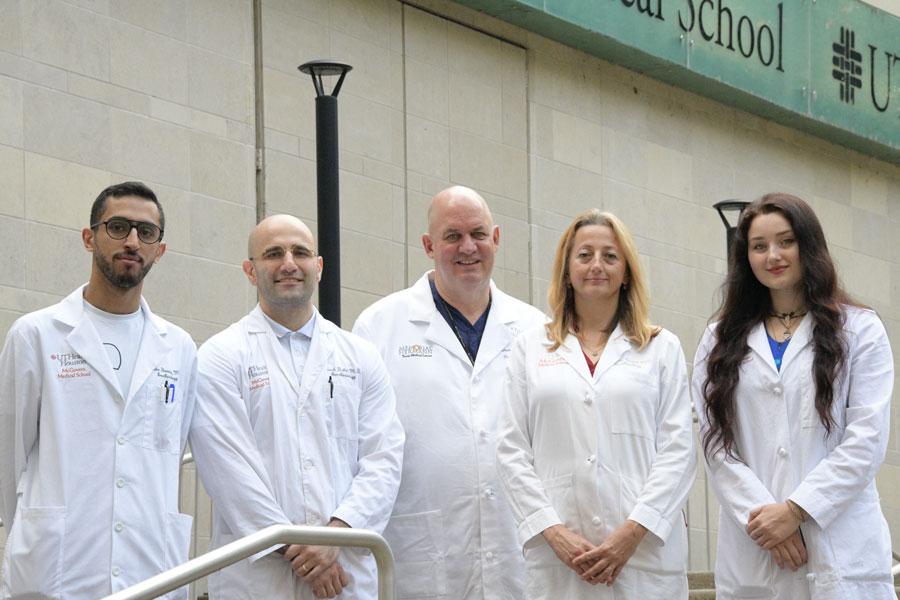Study focuses on microRNA’s link to intestinal inflammation

Recently published research from faculty in the Department of Anesthesiology, Critical Care and Pain Medicine reveals a promising innovative approach to treating inflammatory bowel diseases, such as Crohn’s disease and ulcerative colitis. Researchers report that a novel mechanism involving a protein called HIF-2α could significantly reduce intestinal inflammation.
Inflammatory bowel diseases are chronic conditions characterized by severe inflammation of the digestive tract, leading to debilitating symptoms and a reduced quality of life for millions of people worldwide. Current treatments often involve broad immune suppressants, which can have significant side effects and are not always effective.
Published in Nature Communications, HIF-2α-dependent induction of miR-29a restrains tH1 activity during T cell dependent colitis, is a foundational study that focuses on how T cells, a type of immune cell, behave during intestinal inflammation. Researchers found that during episodes of inflammation, these T cells experience low oxygen levels, which stabilize the HIF-2α protein. This stabilization induces the production of a molecule called miR-29a, which plays a crucial role in dampening the activity of TH1 T cells—immune cells that drive intestinal inflammation.
In experiments with mice, those lacking HIF-2α or miR-29a in their T cells exhibited more severe inflammation. Conversely, increasing HIF-2α levels or delivering miR-29a mimics significantly reduced inflammation. This suggests that therapies aimed at boosting miR-29a could offer a new, targeted way to treat IBD.
“Normally low oxygen is thought of as negative – but in this case, low oxygen turns the miR-29a gene on, decreasing the aggressive nature of the lymphocytes. It inhibits them from making cytokines and limits their ability to proliferate,” said Agnieszka K. Czopik, PhD, assistant professor of anesthesiology and the study’s lead author. “By reducing the harmful immune responses that drive inflammation, we can potentially offer a more effective and safer treatment option for patients.”
The study also explored the therapeutic potential of miR-29a mimics delivered via nanoparticles. Mice treated with these mimics showed marked improvement in intestinal health, further underscoring the potential of this approach.
“This research not only enhances our understanding of the molecular mechanisms driving IBD but also provides a strong foundation for developing new treatments,” added Holger Eltzschig, MD, PhD, co-author of the study.
Further research aims to create more effective and targeted treatments for IBD, improving patient outcomes.
“The beneficial nature of hypoxia can be manipulated to help those suffering from IBD – we have identified a good candidate molecule to be used therapeutically, which we would like to study further,” Czopik added.
Funding from the Paula Mischer Foundation and from Brad McWilliams have been supportive of Czopik’s work.
“These gifts have allowed us to move forward and to further extend studies on this important clinical topic,” Eltzschig said.
Additional authors from the Department of Anesthesiology, Critical Care, and Pain Medicine include Victoria Vaughn, Xiangsheng Huang, In Hyuk Bang, Trent Clark, Yanyu Wang, Wei Ruan, Xiaoyi Yuan. Collaborations from the University of Colorado Anschutz School of Medicine, Aurora, include Eoin McNamee, Tom Nguyen, Joanne C. Masterson, Colm Collins, Mark Gerich, Glenn Futura, Sandra Frank, Howard Li; Eunyoung Tak, University of Ulsan College of Medicine, Seoul, Korea; and Cristian Rodriguez-Aguayo, Gabriel Lopez-Berestein, and Anil Sood, MD Anderson Cancer Center.